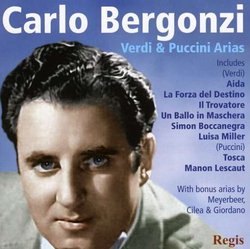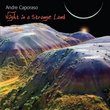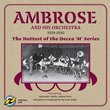| All Artists: Giuseppe Verdi, Giacomo Meyerbeer, Umberto Giordano, Francesco Cilea, Giacomo Puccini, Gianandrea Gavazzeni, Francesco Molinari-Pradelli, Carlo Maria Giulini, Alfredo Simonetto, Saint Cecilia Academy Orchestra, Rome RAI Orchestra, Milan RAI Symphony Orchestra, Carlo Bergonzi Title: Carlo Bergonzi sings Verdi & Puccini Arias Members Wishing: 1 Total Copies: 0 Label: Regis Records Release Date: 1/27/2009 Genre: Classical Style: Opera & Classical Vocal Number of Discs: 1 SwapaCD Credits: 1 UPCs: 675754013431, 5055031313051 |
Search - Giuseppe Verdi, Giacomo Meyerbeer, Umberto Giordano :: Carlo Bergonzi sings Verdi & Puccini Arias
 | Giuseppe Verdi, Giacomo Meyerbeer, Umberto Giordano Carlo Bergonzi sings Verdi & Puccini Arias Genre: Classical
|
Larger Image |
CD DetailsSimilar CDs
|
CD ReviewsDefinitive Bergonzi Ralph Moore | Bishop's Stortford, UK | 03/09/2009 (5 out of 5 stars) "In 1950, the 25 year old baritone Bergonzi retrained as a tenor; for the next thirty years he excelled in performing bel canto, Puccini, verismo and, above all, Verdi operatic rôles. Having sung so well for so long, he was obliged by persistent problems with flatness gradually to abandon the stage for the concert platform, eventually retiring to run his hotel I Due Foscari in Busseto, home town of his beloved Verdi, where he still lives today.
This recital consists mainly of his famous 1958 debut album. It is in superb sound, leaving plenty of air around a voice in prime condition. The programme is essentially a round-up of favourite tenor arias but you'd be hard pushed to find them better sung by anyone else. Bergonzi's voice is instantly recognisable, with his endearing little lisp, quick vibrato and penetrating timbre. He has all the Verdian virtues: weight of tone, perfect legato, trumpeted high notes, crystalline diction - and he even manages a passable trill in "Ah si, ben mio". Gavazzeni's accompaniment is vital and pacy. It is possible to make little carping criticisms: he doesn't attempt, in "Celeste Aida", the almost impossible diminuendo Verdi wrote for the culminating B-flat (apparently he does in his later Verdi survey); in the same aria he wobbles on the second "Ah"; he misses the last degree of tenderness in the prelude "O dolci baci" - but these are tiny flaws in the face of so much superlative singing. Comparisons with later recordings reveal that Bergonzi remained remarkably consistent in his interpretations; there was little need to change that which was already demonstrably so good. His delivery of the great "Forza" showpiece aria is marginally weightier in the complete 1969 recording under Gardelli, and he holds a top B more impressively in the "Ballo" aria in his 1962 recording for Solti - but these are negligible differences; the wonder is that a so fundamentally lyric a voice endured for so long singing some of the most demanding spinto roles in the repertory, when his great contemporary Giuseppe Di Stefano fell by the wayside. No doubt this was due to Bergonzi's superior technique, wiser pacing and more restrained lifestyle - and it is probably true that the recording slightly flatters the real amplitude of his voice, but the sheer youthful vehemence of Bergonzi's attack continues to amaze, as does the beauty of his softer singing. The three bonus tracks are from the frenetic series of live opera radio broadcasts undertaken by RAI in 1951 to celebrate the fiftieth anniversary of Verdi's death. Inevitably the sound is a bit crumbly and constricted but perfectly acceptable. Bergonzi's voice still clearly evinces traces of baritone heft and darkness; he has not yet acquired the squillo which developed over the next year or two but he has clearly found his correct Fach. As long as you are not wedded to modern sound, you will find that these performances are very good in their own right and many are still available on the Cetra/Warner Fonit label; meanwhile, these excerpts serve as a pleasing and historically fascinating sample of Bergonzi's earliest recordings just after his change of tessitura. The best representative sample of Bergonzi's art remains the Decca double CD "Carlo Bergonzi: the sublime voice", which features three of the items on this 1958 recital with the rest culled from complete recordings, but this single Regis disc is beautifully transferred and available at super-bargain price; all lovers of this aristocrat among tenors and great tenor singing in general should snap it up. " |

 Track Listings (15) - Disc #1
Track Listings (15) - Disc #1

